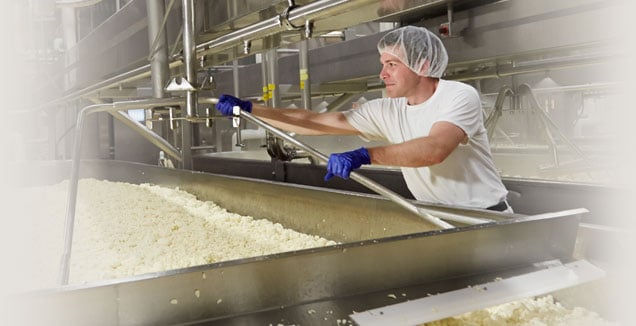Discover the Leading Cheese Factory Melbourne for Fresh Creations
Discover the Leading Cheese Factory Melbourne for Fresh Creations
Blog Article
An In-Depth Check Out Cheese Production: Active Ingredients, Techniques, and the Future of Artisan Cheeses
The detailed procedure of cheese production is a remarkable convergence of art and scientific research, where premium milk, rennet, and certain microbial cultures serve as fundamental components. As the industry progressively focuses on sustainability and openness, the future of artisan cheeses promises to reflect both heritage and development.
Trick Ingredients in Cheese Production
A range of essential components play an essential duty in cheese manufacturing, each contributing to the end product's flavor, structure, and personality. The key ingredient in cheese is milk, which can come from different sources, consisting of cows, goats, and lamb - cheese store melbourne. The kind of milk used substantially affects the cheese's taste and consistency; as an example, cow's milk typically produces creamier cheeses, while goat's milk often generates tangy ranges
An additional essential active ingredient is rennet, an enzyme used to curdle the milk, separating it right into curds and whey. The source of rennet can be animal, veggie, or microbial, each imparting distinct characteristics to the cheese. Cultures, including specific pressures of microorganisms, are additionally indispensable to the cheese-making procedure. They ferment lactose right into lactic acid, helping in flavor development and texture.
Salt not just improves the taste however likewise works as a chemical, hindering the growth of unfavorable bacteria. Furthermore, numerous flavor agents, such as natural herbs, seasonings, or even smoked timber, can be contributed to create unique artisanal cheeses. With each other, these components form the structure of cheese production, establishing the phase for diverse and abundant cheese selections.
Conventional Cheese-Making Techniques
Making use of conventional cheese-making strategies, artisans worldwide maintain time-honored approaches that have been given through generations. These strategies usually highlight making use of high-grade, locally sourced milk, which is main to the distinct tastes and structures of artisanal cheeses. The procedure normally begins with the mindful heating of milk, adhered to by the addition of societies and rennet to help with coagulation.
As soon as the curds create, they are reduced, allowing whey to drain, a vital action that affects moisture content and texture. Salting is a vital facet of this process, improving flavor while likewise acting as a chemical.
Aging, or affinage, is an additional vital component, during which cheeses develop their particular fragrances and tastes. Craftsmens might utilize certain aging atmospheres, using humidity and temperature level controls to improve celebrity's account. The commitment to these conventional techniques not only supports neighborhood economic climates but additionally adds to the rich diversity of cheese selections located around the world, commemorating cultural heritage and artisanal workmanship.
Modern Technologies in Cheese Production
Exactly how have technological innovations changed cheese manufacturing in current years? The integration of contemporary technology has changed both the effectiveness and high quality of cheese manufacturing.
In addition, innovations in microbiology have made it possible for cheesemakers to pick details bacterial societies and enzymes, maximizing flavor profiles and boosting rack life. The usage of sensing unit technology for keeping an eye on fermentation conditions has also ended up being prevalent, enabling real-time modifications to maintain optimal atmospheres for cheese aging.

These innovations not just enhance the top quality and sustainability of cheese production however also encourage artisan manufacturers to keep conventional flavors while welcoming contemporary effectiveness. As technology remains to advance, the future content of cheese production looks encouraging, blending custom with innovation.
The Duty of Terroir in Cheese
In the realm of cheese manufacturing, terroir plays a critical duty in defining the distinctive attributes of different cheeses. Terroir, a French term generally related to white wine, encompasses the ecological factors that affect farming products, consisting of dirt make-up, climate, and local vegetation and fauna. In cheese-making, the special features of the area where the milk is sourced can impart particular flavors and textures to the end product.
As an example, the grazing conditions of milk animals dramatically affect the milk's make-up, influenced by the sorts of turfs and natural herbs available in a specific locale. This varies not just between nations yet additionally in between areas within the same country. Furthermore, the microbial areas present in the atmosphere add to the fermentation procedures, leading to diverse profiles in taste and fragrance.
Cheeses such as Roquefort, Parmigiano-Reggiano, and Cheddar exhibit how terroir can shape their identities, making them distinct and often secured by geographical signs. As manufacturers significantly recognize the importance of terroir, there is a growing emphasis on sourcing local components and click over here preserving standard techniques, ensuring that each cheese absolutely mirrors its beginning.

Future Trends in Craftsmen Cheeses
A noteworthy shift is look here occurring in the artisan cheese field, driven by progressing consumer choices and technological improvements. Significantly, customers are inclining distinct, high-quality products that stress both sustainability and local sourcing - cheese factory melbourne. This pattern is prompting artisan cheesemakers to innovate, concentrating on small-batch production and using traditional strategies while incorporating modern innovation to enhance high quality and safety and security
Additionally, there is an expanding interest in plant-based and alternate milk products, pushing typical cheesemakers to explore brand-new methods, such as cashew or almond-based cheeses. This shift not just deals with nutritional restrictions however additionally aligns with ecological concerns relating to pet farming.
Additionally, transparency in sourcing and manufacturing procedures is becoming critical. Customers are extra educated and demand traceability, motivating manufacturers to adopt more clear labeling methods and take part in narration that highlights their approaches and values.
Verdict
Finally, the elaborate process of cheese manufacturing blends traditional techniques with modern advancements, causing a varied selection of tastes and appearances. The focus on high-quality ingredients and the influence of terroir underscore the artistry associated with cheese production. As the industry evolves, an emphasis on sustainability and openness will likely form the future of artisan cheeses, accommodating a significantly critical customer base that values credibility and workmanship in dairy products.
Report this page